Irving Cutter, MD, dean of the University of Nebraska College of Medicine, knew when the university completed the hospital in 1917, nurses would be needed to staff the wards. The School of Nursing was established that same year as a part of the College of Medicine.
At the time, most nursing schools did not affiliate with universities. For direction, Dr. Cutter reached out to one of the pioneers in American nursing, Adelaide Nutting. She recommended a superintendent of nurses for the University of Nebraska, Charlotte Burgess, a graduate of the University of Wisconsin and the Illinois Training School for Nurses.
When Burgess arrived in Omaha, she recruited four graduate nurses to staff the operating room and two patient floors, and to act as night supervisor.
According to the 1919-1920 School of Nursing Bulletin, the school’s purpose was “to develop nurses of the best type.” To that end, Burgess set out to lay the foundation of today’s UNMC College of Nursing.
Within a couple of years, Burgess had assembled instructors for courses in obstetrical nursing, surgical nursing, medical nursing and dietetics. Nurse Myra Tucker oversaw the nursing instructors. Josephine Chamberlain, who had served as a nurse in Europe during the First World War, was the dispensary directress.
The dispensary, located in the south laboratory (today Bennett Hall), provided medical care to the public. Services in the dispensary included clinics such as dermatology, eye, ENT, orthopedics, obstetrics and gynecology. The dispensary also housed a drug department. Second- and third-year nurses assisted in staffing the dispensary.
The School of Nursing course of instruction covered three years. College of Medicine faculty taught basic science courses. Studies included, but were not limited to, anatomy, drugs and solutions, hospital hygiene, physical education, nursing in infections and contagious diseases, ethics of nursing, nursing in mental and nervous diseases and nursing in skin, venereal and occupational diseases.
In the early years, the School of Nursing required applicants to be between the ages of 19 and 35 years old and to be unmarried. Applicants also needed to be in good health and physical condition and able to provide positive character references. Applicants were required to be high school graduates. Burgess, as superintendent, made the final decision on admitting applicants.
After a probation period, student nurses worked in the university hospital wards for eight to 12 hours a day. The supervisors would not place students on night duty until after five months in school, and the students could serve on night duty for no more than one month at a time. Their time off consisted of half a Sunday and one afternoon during the week. After a night duty rotation, students would receive two days off.
Although many changes have been implemented through the years, discipline, hard work and attention to duty were, and still are, the UNMC College of Nursing’s hallmarks.
